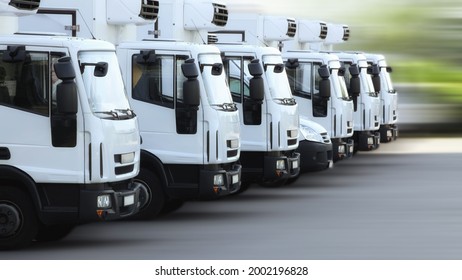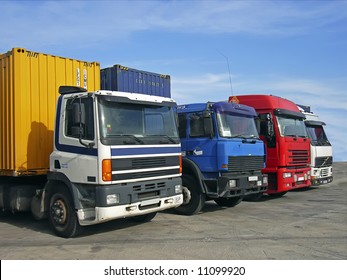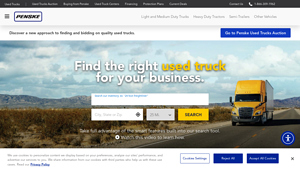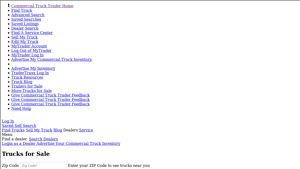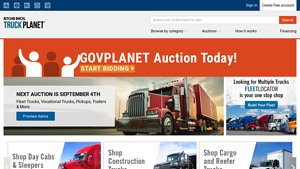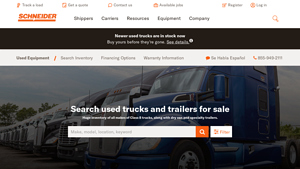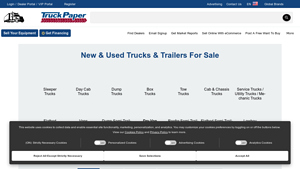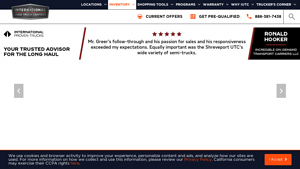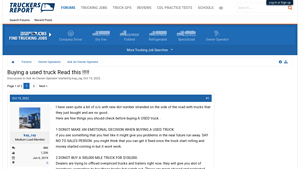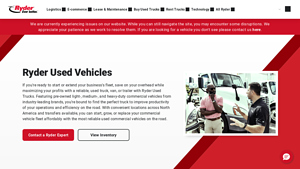Introduction: Navigating the Global Market for used Transport Truck
In the rapidly evolving global market, sourcing used transport trucks presents a unique set of challenges for international B2B buyers. Whether you’re operating in the bustling logistics hubs of Nigeria or navigating the diverse terrains of South America, identifying reliable suppliers and understanding the nuances of quality assurance are paramount. This comprehensive guide addresses these challenges head-on, providing insights into various types of used transport trucks, their applications, and essential factors to consider when evaluating suppliers.
From heavy-duty tractors to refrigerated vehicles, the range of options can be overwhelming. Our guide delves into the specific requirements for different industries, ensuring that you select the right trucks to meet your operational needs. Additionally, we explore critical aspects of supplier vetting, cost analysis, and financing options, empowering you to make informed purchasing decisions.
With a focus on the unique demands of buyers from Africa, South America, the Middle East, and Europe, this resource serves as a vital tool in your procurement strategy. By equipping you with actionable insights and expert recommendations, we aim to streamline your sourcing process, mitigate risks, and ultimately enhance your fleet’s efficiency and reliability. Embrace the opportunity to leverage our expertise and navigate the global market for used transport trucks with confidence.
Understanding used Transport Truck Types and Variations
| Type Name | Key Distinguishing Features | Primary B2B Applications | Brief Pros & Cons for Buyers |
|---|---|---|---|
| Semi Trucks | Large, powerful trucks with a detachable trailer | Long-haul freight transport | Pros: High towing capacity, versatile; Cons: Higher maintenance costs, requires skilled drivers. |
| Box Trucks | Enclosed cargo area with a separate cab | Local deliveries and moving services | Pros: Secure cargo transport, easy loading; Cons: Limited visibility, less maneuverable. |
| Dump Trucks | Open-box design with hydraulic lift | Construction, waste management | Pros: Efficient for bulk material transport; Cons: Limited to specific tasks, can be heavy on fuel. |
| Reefer Trucks | Insulated cargo area with refrigeration capabilities | Perishable goods transport | Pros: Maintains temperature-sensitive cargo; Cons: Higher initial cost, more complex maintenance. |
| Flatbed Trucks | Open bed design for versatile loading options | Construction, agriculture, and freight | Pros: Flexible cargo options, easy loading/unloading; Cons: Less secure cargo transport, exposure to elements. |
What Are the Key Characteristics of Semi Trucks for B2B Buyers?
Semi trucks are designed for heavy-duty transport, featuring a powerful engine and a detachable trailer that allows for efficient long-haul shipping. Their ability to handle large loads makes them ideal for freight companies and logistics providers. When considering a semi truck purchase, buyers should evaluate the vehicle’s mileage, maintenance history, and the specific needs of their transport operations. Additionally, understanding the regulatory requirements for drivers and vehicles in different regions is crucial for smooth operations.
How Do Box Trucks Serve Local Businesses Effectively?
Box trucks, characterized by their enclosed cargo area, are particularly suited for local deliveries and moving services. Their design facilitates secure transport of goods while offering ease of loading and unloading through rear or side doors. B2B buyers should assess the truck’s payload capacity and interior dimensions to ensure it meets their operational needs. Furthermore, considering the truck’s fuel efficiency and maneuverability in urban environments can significantly impact logistics costs.
Why Choose Dump Trucks for Construction and Waste Management?
Dump trucks feature a distinctive open-box design that allows for the efficient transport of bulk materials. They are commonly used in construction and waste management sectors, where the ability to unload materials quickly is essential. Buyers should consider the truck’s lifting capacity, bed size, and overall durability. Additionally, understanding the specific requirements for the types of materials being transported can help in selecting the right model for their operations.
What Advantages Do Reefer Trucks Offer for Perishable Goods?
Reefer trucks are equipped with refrigeration units to transport temperature-sensitive goods, making them vital for businesses dealing in perishable items. Their insulated cargo areas help maintain specific temperature ranges, ensuring product quality during transit. B2B buyers should focus on the refrigeration system’s efficiency and reliability, as well as the truck’s overall condition. Additionally, understanding local regulations regarding the transport of perishable goods can influence purchasing decisions.
How Do Flatbed Trucks Enhance Versatility in Cargo Transport?
Flatbed trucks provide an open bed design that offers flexibility in loading various types of cargo, including oversized items. They are widely used in construction, agriculture, and freight industries due to their ease of loading and unloading. Buyers should consider the truck’s weight capacity and compatibility with different types of loads. While flatbeds offer versatility, potential buyers should also be aware of the need for secure loading methods to protect cargo during transport.
Key Industrial Applications of used Transport Truck
| Industry/Sector | Specific Application of used Transport Truck | Value/Benefit for the Business | Key Sourcing Considerations for this Application |
|---|---|---|---|
| Logistics and Freight | Long-haul transportation of goods | Reduces transportation costs and improves delivery efficiency | Assess truck condition, mileage, and maintenance history |
| Construction | Hauling building materials and heavy equipment | Enhances project timelines and reduces labor costs | Evaluate payload capacity and compatibility with existing fleet |
| Agriculture | Transporting produce and livestock | Ensures timely delivery and minimizes spoilage | Consider refrigeration options for perishables and terrain capability |
| Mining and Extraction | Moving raw materials and equipment | Increases operational efficiency and reduces downtime | Verify durability and off-road capabilities |
| Retail and Distribution | Delivering goods to retail outlets | Improves customer satisfaction through timely deliveries | Analyze size and load capacity based on delivery routes |
How Are Used Transport Trucks Applied in Various Industries?
Logistics and Freight: Used transport trucks play a crucial role in logistics by facilitating long-haul transportation of goods across vast distances. These trucks help businesses lower transportation costs while enhancing delivery efficiency. For international buyers, particularly in regions like Africa and South America, it’s essential to evaluate the truck’s condition, mileage, and maintenance history to ensure reliability and longevity in operations.
Construction: In the construction industry, used transport trucks are vital for hauling building materials and heavy equipment to and from job sites. This capability enhances project timelines and can significantly reduce labor costs by streamlining the supply chain. Buyers should focus on the truck’s payload capacity and its compatibility with their existing fleet to ensure seamless integration into their operations.
Agriculture: In agriculture, transport trucks are employed to move produce and livestock from farms to markets or processing facilities. Timely deliveries are crucial in this sector to minimize spoilage and ensure freshness. Buyers should consider refrigeration options for perishables and the truck’s capability to navigate various terrains, especially in rural areas of Africa and South America.
Mining and Extraction: Used transport trucks are essential in the mining sector for moving raw materials and heavy equipment. Their robust design increases operational efficiency and reduces downtime, which is critical in high-stakes environments. Buyers must verify the truck’s durability and off-road capabilities, particularly in remote mining locations often found in the Middle East and Africa.
Retail and Distribution: In retail, used transport trucks are used to deliver goods to various retail outlets, ensuring that stock levels are maintained and customer satisfaction is achieved through timely deliveries. For businesses sourcing trucks for this application, analyzing the size and load capacity based on delivery routes is vital to optimizing logistics and minimizing costs.
3 Common User Pain Points for ‘used Transport Truck’ & Their Solutions
Scenario 1: Difficulty in Assessing the Quality of Used Transport Trucks
The Problem:
B2B buyers, especially those in emerging markets such as Nigeria and Brazil, often face the challenge of evaluating the quality and reliability of used transport trucks. Without access to proper inspection tools or standards, they risk purchasing vehicles that may have hidden defects or lower performance capabilities. This situation can lead to increased maintenance costs, unexpected downtime, and potential losses in logistics efficiency.
The Solution:
To mitigate this issue, buyers should leverage comprehensive pre-purchase inspections that are often provided by reputable dealers. It’s crucial to request a detailed vehicle history report that includes maintenance records, accident history, and ownership details. Additionally, consider employing third-party inspection services that specialize in used commercial vehicles. These professionals can conduct thorough assessments, including engine diagnostics and chassis inspections, ensuring that the truck meets operational standards. Furthermore, buyers should prioritize dealers that offer a limited warranty or a “Truck Protect Promise,” which can provide additional peace of mind regarding the vehicle’s condition.
Scenario 2: Navigating Complex Financing Options for Used Transport Trucks
The Problem:
Many international buyers encounter difficulties in securing financing for used transport trucks. This challenge is particularly pronounced in regions like the Middle East and South America, where local banks may have stringent lending criteria or limited familiarity with commercial vehicle financing. As a result, businesses may either face high-interest rates or find themselves unable to acquire the necessary funding to expand their fleet.
The Solution:
To overcome financing hurdles, buyers should explore specialized financing programs that cater specifically to commercial vehicles. Engaging with lenders who have a strong understanding of the transport industry can help secure better rates and terms. Additionally, companies can benefit from seeking out financing solutions that allow for flexible payment structures, such as seasonal payment plans that align with their cash flow cycles. Buyers should also consider working with brokers who specialize in commercial truck financing; these professionals can provide insights into competitive offers and help navigate the application process, ensuring that businesses can acquire the vehicles they need without jeopardizing their financial stability.
Scenario 3: Understanding Regulatory Compliance and Maintenance Needs
The Problem:
In regions with evolving regulations regarding commercial transport, such as Europe and parts of Africa, B2B buyers often struggle to stay compliant with local laws. This includes adhering to emissions standards, safety inspections, and maintenance schedules. Non-compliance can lead to hefty fines, operational delays, and even the inability to legally operate vehicles.
The Solution:
To navigate the complexities of regulatory compliance, businesses should invest time in understanding the specific requirements of their operating regions. This includes staying updated on local regulations and ensuring that any used transport trucks purchased comply with these standards. Buyers can subscribe to industry newsletters or join local trucking associations that provide resources on compliance updates. Additionally, implementing a robust maintenance management system can help track service schedules and inspections, ensuring that all vehicles remain in compliance. Partnering with dealers who offer ongoing support, such as maintenance tips and compliance updates, can further enhance operational efficiency and minimize risks associated with regulatory challenges.
Strategic Material Selection Guide for used Transport Truck
What Are the Key Materials Used in Transport Trucks?
When selecting used transport trucks, understanding the materials used in their construction is crucial for ensuring performance, durability, and compliance with industry standards. Here, we analyze four common materials used in transport truck manufacturing: steel, aluminum, composite materials, and plastics.
How Does Steel Impact the Performance of Used Transport Trucks?
Steel is one of the most widely used materials in the construction of transport trucks, particularly for the frame, chassis, and body panels. Its key properties include high tensile strength and excellent durability, making it suitable for heavy-duty applications. Steel can withstand high temperatures and pressures, which is essential for trucks that operate under demanding conditions.
Pros and Cons: The primary advantage of steel is its robustness and resistance to deformation under load. However, it is prone to corrosion, which can be a significant issue in humid or coastal environments. Additionally, the weight of steel can impact fuel efficiency, a critical factor for many businesses.
Impact on Application: Steel’s compatibility with various media, including fuel and lubricants, makes it a reliable choice for transport trucks. However, international buyers must consider local regulations regarding emissions and weight limits, as these can affect operational efficiency.
What Role Does Aluminum Play in Transport Truck Design?
Aluminum is increasingly popular in the transport truck industry due to its lightweight properties and resistance to corrosion. This material is often used for truck bodies, trailers, and some internal components. Aluminum’s ability to withstand extreme temperatures without losing structural integrity is another significant advantage.
Pros and Cons: The main advantage of aluminum is its weight reduction, which can lead to improved fuel efficiency and payload capacity. On the downside, aluminum can be more expensive than steel and may require specialized welding techniques, increasing manufacturing complexity.
Impact on Application: Aluminum’s corrosion resistance makes it ideal for trucks operating in coastal areas or regions with high humidity. International buyers should be aware of varying standards for aluminum alloys, which can differ significantly between regions, impacting compliance and repairability.
How Do Composite Materials Enhance Transport Truck Performance?
Composite materials, such as fiberglass and carbon fiber, are becoming more common in the transport truck industry. These materials offer high strength-to-weight ratios and excellent resistance to environmental factors, including UV light and moisture.
Pros and Cons: The primary advantage of composites is their lightweight nature, contributing to better fuel efficiency and reduced wear on other truck components. However, they can be more expensive and complex to manufacture, which may deter some buyers.
Impact on Application: Composites are particularly suitable for specialized applications, such as refrigerated trucks, where insulation properties are crucial. International buyers should consider the availability of repair facilities for composite materials, as these may not be as widespread in some regions.
What Are the Benefits of Using Plastics in Transport Trucks?
Plastics are increasingly utilized in various components of transport trucks, including interior fittings, fuel tanks, and bumpers. They offer excellent resistance to corrosion and chemicals, making them suitable for diverse applications.
Pros and Cons: The advantages of plastics include their lightweight nature and cost-effectiveness compared to metals. However, they may not provide the same level of structural integrity as metals and can be susceptible to UV degradation over time.
Impact on Application: Plastics are often used in applications where weight savings are essential, such as in fuel tanks and non-structural components. International buyers should be aware of the differences in plastic grades and their compliance with safety standards, which can vary by region.
Summary of Material Selection for Used Transport Trucks
| Material | Typical Use Case for used Transport Truck | Key Advantage | Key Disadvantage/Limitation | Relative Cost (Low/Med/High) |
|---|---|---|---|---|
| Steel | Frame, chassis, body panels | High strength and durability | Prone to corrosion | Medium |
| Aluminum | Truck bodies, trailers | Lightweight, corrosion-resistant | Higher cost, complex manufacturing | High |
| Composite | Specialized applications, refrigerated trucks | High strength-to-weight ratio | Expensive, complex to repair | High |
| Plastics | Interior fittings, fuel tanks | Lightweight, cost-effective | Lower structural integrity | Low |
This guide provides a comprehensive overview of the materials used in transport trucks, enabling international B2B buyers to make informed decisions that align with their operational needs and regional compliance requirements.
In-depth Look: Manufacturing Processes and Quality Assurance for used Transport Truck
What Are the Key Stages in the Manufacturing Process of Used Transport Trucks?
The manufacturing process of used transport trucks involves several critical stages that ensure the vehicles are restored to a condition suitable for resale. Understanding these stages can help B2B buyers make informed decisions when sourcing used trucks.
Material Preparation: What Components Are Essential?
Material preparation is the foundational step in the manufacturing process. It involves sourcing high-quality materials that meet industry specifications. Components such as steel for the chassis, aluminum for lightweight structures, and various polymers for interior fittings are crucial. Buyers should ensure that suppliers use materials that comply with international standards, which can significantly affect the truck’s durability and performance.
Forming: How Are Truck Parts Shaped?
The forming stage encompasses various techniques to shape the materials into truck components. Processes like stamping, forging, and casting are commonly employed. For instance, the chassis is typically stamped from high-strength steel sheets, while engine components may be cast from aluminum alloys. Buyers should inquire about the forming techniques used and their compliance with relevant standards, as this can impact the structural integrity of the trucks.
Assembly: What Are the Key Assembly Techniques?
Assembly is where the individual components come together to form a complete vehicle. This stage often utilizes robotic automation for precision and efficiency, particularly in the installation of electrical systems and drivetrain components. A well-organized assembly line is vital for maintaining quality control. Buyers should consider suppliers that employ lean manufacturing principles to minimize waste and enhance productivity.
Finishing: How Is the Final Product Prepared for Sale?
Finishing involves painting, coating, and detailing the truck to enhance its aesthetic appeal and protect it from environmental factors. Techniques like powder coating and electrostatic painting are prevalent for their durability. Additionally, finishing includes rigorous cleaning processes to ensure the vehicle is presentable for potential buyers. International buyers should verify that finishing processes meet local regulations regarding emissions and safety.
What Quality Assurance Practices Are Essential for Used Transport Trucks?
Quality assurance (QA) is paramount in ensuring that used transport trucks meet safety and performance standards. Various international and industry-specific standards guide the QA processes.
What International Standards Should Buyers Be Aware Of?
One of the most recognized international quality standards is ISO 9001, which focuses on quality management systems. Compliance with this standard indicates that the manufacturer has implemented effective processes for ensuring product quality. In addition, certifications like CE mark (for safety compliance in Europe) and API (American Petroleum Institute for components related to the oil and gas industry) are also relevant. Buyers should request documentation that confirms these certifications.
What Are the Key Quality Control Checkpoints?
Quality control (QC) checkpoints are critical for maintaining standards throughout the manufacturing process. Common checkpoints include:
-
Incoming Quality Control (IQC): This involves inspecting raw materials and components upon arrival at the facility. Ensuring that only materials meeting specifications enter the production process is vital.
-
In-Process Quality Control (IPQC): During the manufacturing process, periodic checks are conducted to ensure that each stage meets quality standards. This could involve monitoring assembly tolerances or the integrity of welds.
-
Final Quality Control (FQC): Once the truck is assembled, a thorough inspection is conducted. This includes functional tests, safety checks, and aesthetic evaluations to ensure the vehicle is ready for sale.
How Can B2B Buyers Verify Supplier Quality Control?
Due diligence is essential for B2B buyers looking to verify the quality control practices of suppliers. Here are effective strategies:
What Are the Best Practices for Conducting Supplier Audits?
Conducting supplier audits is one of the most effective ways to assess a manufacturer’s QC processes. Buyers should establish a checklist that includes verification of certifications, inspection reports, and adherence to manufacturing standards. Regular audits can help ensure that suppliers maintain consistent quality.
How Can Buyers Utilize Quality Reports and Third-Party Inspections?
Requesting quality reports from suppliers can provide insights into their QC processes. These reports should detail inspection results, defect rates, and corrective actions taken. Additionally, engaging third-party inspection services can offer unbiased assessments of the trucks before purchase. This is particularly useful for international buyers who may not have the resources to conduct on-site inspections.
What Are the Nuances of Quality Control for International Buyers?
International buyers, especially from regions like Africa, South America, the Middle East, and Europe, face unique challenges in verifying QC practices.
How Do Regional Regulations Affect Quality Standards?
Different regions have varying regulations and standards for vehicle safety and emissions. For instance, the European Union has stringent regulations on emissions, which can affect the resale value of trucks in that market. Buyers should familiarize themselves with local regulations to ensure compliance and avoid potential legal issues.
What Should Buyers Know About Warranty and After-Sales Support?
Understanding the warranty terms and after-sales support provided by suppliers is crucial. Some manufacturers offer warranties that cover specific components or provide maintenance support. This can significantly enhance the value proposition of a used transport truck. Buyers should ensure that warranty terms are clearly defined and comply with local laws.
Conclusion: How to Make Informed Decisions When Sourcing Used Transport Trucks?
By understanding the manufacturing processes and quality assurance practices involved in the production of used transport trucks, B2B buyers can make informed purchasing decisions. Emphasizing due diligence through audits, quality reports, and compliance with international standards will help ensure that the vehicles sourced meet the required safety and performance benchmarks, ultimately leading to successful business operations.
Practical Sourcing Guide: A Step-by-Step Checklist for ‘used Transport Truck’
In today’s competitive marketplace, sourcing a used transport truck requires a strategic approach to ensure you acquire the right vehicle for your business needs. This checklist provides a structured process to guide B2B buyers through the procurement of used transport trucks, focusing on essential steps to maximize value and minimize risks.
Step 1: Define Your Technical Specifications
Start by outlining the specific requirements for the used transport truck. This includes the type of truck (e.g., flatbed, refrigerated, or cargo van), weight capacity, engine specifications, and fuel efficiency. Clearly defined specifications help streamline your search and ensure that the trucks you consider will meet your operational needs.
Step 2: Research Market Prices
Conduct thorough research on the current market prices for used transport trucks. Utilize online platforms and industry reports to gather information on average pricing for different makes and models. Understanding market trends will empower you to negotiate better and avoid overpaying.
Step 3: Evaluate Potential Suppliers
Before committing to a purchase, it’s crucial to vet potential suppliers thoroughly. Look for reputable dealers with strong industry experience and positive reviews. Request company profiles, case studies, and references from previous buyers in similar industries to gauge reliability and service quality.
- Check Certifications: Ensure that suppliers are certified and comply with relevant industry standards.
- Assess Inventory Variety: A diverse inventory indicates a supplier’s ability to cater to various needs.
Step 4: Inspect the Vehicle Thoroughly
Once you identify potential trucks, arrange for a comprehensive inspection. This should include a mechanical review, checking the truck’s history report for accidents or repairs, and verifying maintenance records. A thorough inspection helps uncover hidden issues that could lead to costly repairs down the line.
Step 5: Review Financing Options
Explore financing solutions to support your purchase. Many suppliers offer financing programs tailored for commercial vehicles. Assess the terms and interest rates from different lenders to find the best deal that aligns with your budget and cash flow requirements.
- Consider Leasing: If purchasing outright isn’t feasible, leasing can be a viable alternative, providing flexibility without significant upfront costs.
Step 6: Understand Warranty and Protection Plans
Investigate warranty options and equipment protection plans offered by the supplier. A solid warranty can safeguard your investment against unforeseen repairs, while protection plans can provide additional peace of mind. Ensure you understand the coverage details, duration, and any exclusions.
Step 7: Finalize the Purchase with Due Diligence
Before finalizing the purchase, ensure all documentation is in order, including the bill of sale, title transfer, and any financing agreements. Verify that all terms are clearly stated and agreed upon. This step is crucial to avoid future disputes and ensure a smooth transaction.
By following this checklist, B2B buyers can navigate the complexities of sourcing used transport trucks effectively, ensuring they make informed decisions that enhance their operational capabilities.
Comprehensive Cost and Pricing Analysis for used Transport Truck Sourcing
What Are the Key Cost Components in Sourcing Used Transport Trucks?
When sourcing used transport trucks, understanding the cost structure is essential for making informed purchasing decisions. The primary cost components include:
-
Materials: The condition and quality of the materials used in the truck’s construction significantly impact the price. High-quality steel, durable interiors, and advanced technology can drive costs up.
-
Labor: Labor costs encompass both the assembly of the truck and the labor involved in refurbishing used vehicles. Experienced technicians may charge more, but their expertise can ensure better quality and longevity.
-
Manufacturing Overhead: This includes indirect costs such as utilities, rent, and administrative expenses. Established manufacturers may have lower overhead per unit due to economies of scale.
-
Tooling: Custom modifications or repairs may require specialized tools, which can add to the overall cost. Buyers should inquire about any tooling expenses associated with specific upgrades.
-
Quality Control (QC): Rigorous QC processes can elevate costs but are vital for ensuring the reliability and safety of the trucks. Investing in trucks that have undergone thorough QC can prevent future repair costs.
-
Logistics: Transportation costs for delivering the truck can vary based on distance and mode of transport. International buyers should consider these costs when calculating the total expenditure.
-
Margin: Suppliers add a margin to cover their risks and profit. Understanding their pricing strategy can help buyers negotiate better deals.
How Do Price Influencers Affect Used Transport Truck Pricing?
Several factors can influence the price of used transport trucks, particularly for B2B buyers:
-
Volume/MOQ: Purchasing in bulk often leads to discounts. Establishing a Minimum Order Quantity (MOQ) can help negotiate better pricing.
-
Specifications and Customization: Trucks with specific features or custom modifications may command higher prices. Clearly defining your requirements can help avoid unnecessary costs.
-
Materials: Trucks made from premium materials or equipped with advanced technology can be more expensive. Buyers should assess whether these features align with their operational needs.
-
Quality and Certifications: Vehicles with certifications indicating compliance with safety and environmental standards can be more costly but often provide better long-term value.
-
Supplier Factors: The reputation and reliability of the supplier can affect pricing. Established suppliers may offer warranties and maintenance services that justify higher costs.
-
Incoterms: Understanding the shipping terms and responsibilities can significantly affect total costs. Different Incoterms can shift risks and costs between buyers and sellers.
What Buyer Tips Can Help Negotiate Better Prices for Used Transport Trucks?
When navigating the used transport truck market, particularly for international transactions, buyers can employ several strategies:
-
Negotiation Skills: Effective negotiation can lead to significant savings. Understand the supplier’s pricing structure and be prepared to discuss each cost component.
-
Focus on Cost-Efficiency: Assess the Total Cost of Ownership (TCO), which includes maintenance, fuel efficiency, and insurance costs over the truck’s lifespan. A lower upfront price may not always equate to overall savings.
-
Understand Pricing Nuances for International Markets: Different regions may have varying price points due to local demand, availability, and import/export tariffs. Conduct market research specific to your area (e.g., Nigeria, Saudi Arabia) to ensure competitive pricing.
-
Request Detailed Quotes: Always ask for a breakdown of costs and any additional fees. This transparency can help identify areas for negotiation.
-
Explore Financing Options: Many suppliers offer financing programs. Understanding your financing options can help manage cash flow and make purchasing decisions more feasible.
Disclaimer on Indicative Prices
Prices for used transport trucks can fluctuate significantly based on market conditions, availability, and specific buyer requirements. Always consult with suppliers for current pricing and consider obtaining multiple quotes to ensure competitive pricing.
Alternatives Analysis: Comparing used Transport Truck With Other Solutions
Understanding Alternatives to Used Transport Trucks for B2B Buyers
In the transportation and logistics sector, choosing the right vehicle solution is critical for operational efficiency and cost-effectiveness. While used transport trucks are a popular option for many businesses, alternative solutions can also provide value depending on specific needs and circumstances. This analysis compares used transport trucks against alternative solutions such as leasing new trucks and utilizing third-party logistics (3PL) services.
Comparison Table
| Comparison Aspect | Used Transport Truck | Leasing New Trucks | Third-Party Logistics (3PL) |
|---|---|---|---|
| Performance | Reliable; proven models | High performance; latest tech | Variable; depends on provider |
| Cost | Lower initial investment | Higher monthly payments | Variable; pay-per-use pricing |
| Ease of Implementation | Requires upfront purchase | Quick setup; less hassle | Minimal setup; contracts involved |
| Maintenance | Ongoing costs; varies by age | Maintenance included | Provider handles maintenance |
| Best Use Case | Long-term transport needs | Short-term or fluctuating needs | Flexibility and scale in logistics |
Pros and Cons of Each Alternative
1. Leasing New Trucks
Leasing new trucks can be an attractive option for businesses that prioritize performance and reliability. New trucks come equipped with the latest technology and features that enhance fuel efficiency and driver safety. However, the monthly payments can be significantly higher than the upfront cost of purchasing a used truck, which might strain budgets, especially for small to medium-sized enterprises. Leasing also often includes maintenance packages, reducing the burden on the business to manage upkeep. This option is ideal for businesses with fluctuating transportation needs or those that prefer to keep their fleet modern and efficient.
2. Third-Party Logistics (3PL)
Utilizing third-party logistics providers can significantly streamline operations for companies looking to minimize their transport management responsibilities. 3PL services offer flexibility, scalability, and often include comprehensive logistics solutions like warehousing, transportation, and distribution. The cost structure is typically pay-per-use, which can be cost-effective for businesses with variable shipping volumes. However, the variability in service quality and dependence on a third party can lead to inconsistencies. This option is best suited for businesses seeking to offload logistics management and focus on core operations while maintaining flexibility in their transport needs.
Conclusion: How to Choose the Right Solution for Your Business
When deciding between used transport trucks and alternative solutions such as leasing or 3PL, B2B buyers must assess their specific needs, budget constraints, and operational goals. A used transport truck may provide a more cost-effective long-term solution for consistent transport needs, while leasing could be beneficial for those needing flexibility and modern features. On the other hand, 3PL services offer comprehensive logistics management, ideal for businesses looking to streamline operations without investing heavily in their own fleet. Ultimately, the right choice will depend on a careful analysis of operational demands and financial considerations.
Essential Technical Properties and Trade Terminology for used Transport Truck
What Are the Key Technical Properties of Used Transport Trucks?
Understanding the essential technical properties of used transport trucks is crucial for B2B buyers looking to make informed purchasing decisions. Here are several critical specifications to consider:
-
Engine Type and Capacity
The engine type (diesel, gasoline, or alternative fuels) and its capacity (measured in liters or horsepower) significantly impact performance, fuel efficiency, and operational costs. Diesel engines are commonly favored for their durability and efficiency, particularly in heavy-duty applications. For businesses operating in remote areas or with specific environmental considerations, understanding the engine’s fuel type can inform both cost and compliance with local regulations. -
Payload Capacity
This specification refers to the maximum weight a truck can safely carry, including cargo and passengers. It is crucial for businesses to assess their transportation needs and ensure that the truck’s payload capacity aligns with their operational requirements. Exceeding this limit can lead to safety hazards and legal penalties, making it vital for buyers to choose trucks that can handle their expected loads. -
Transmission Type
Used transport trucks may feature automatic or manual transmissions. The choice between the two can affect driving ease, maintenance, and fuel efficiency. Automatic transmissions are often preferred for urban environments, where stop-and-go traffic is common, while manual transmissions can provide better fuel economy in long-haul conditions. Understanding the transmission type can help buyers determine the best fit for their operational needs. -
Mileage (Odometer Reading)
The mileage indicates how many miles the truck has been driven and can serve as a proxy for its wear and tear. Generally, lower mileage suggests less wear, but it is also essential to consider the truck’s maintenance history. An older truck with higher mileage that has been well-maintained may be more reliable than a newer truck with a poor service record. Buyers should scrutinize both mileage and maintenance documentation. -
Chassis and Frame Material
The material used for the chassis and frame (often steel or aluminum) impacts the truck’s durability and weight. Steel frames offer strength and longevity but can add weight, potentially reducing payload capacity. Conversely, aluminum frames are lighter, improving fuel efficiency but may not be as robust. Buyers should consider the operational environment and the typical loads when assessing chassis material. -
Brake System Type
Understanding the type of brake system (air brakes vs. hydraulic brakes) is vital for safety and compliance with regulations. Air brakes are commonly used in larger trucks due to their reliability and effectiveness in heavy loads. Buyers should ensure that the brake system meets the necessary safety standards for their intended use.
What Are the Common Trade Terms Used in the Transport Truck Industry?
Familiarity with industry jargon is essential for B2B buyers to navigate the purchasing process effectively. Here are several key terms:
-
OEM (Original Equipment Manufacturer)
This term refers to the company that originally manufactured a truck’s components or the entire vehicle. When purchasing used trucks, knowing whether parts are OEM or aftermarket can impact warranty coverage and compatibility with existing fleet vehicles. -
MOQ (Minimum Order Quantity)
This term indicates the smallest amount of a product that a supplier is willing to sell. For buyers looking to purchase multiple units, understanding the MOQ can help in negotiating bulk purchase agreements and optimizing inventory costs. -
RFQ (Request for Quotation)
An RFQ is a formal document sent to suppliers requesting pricing and terms for specific products or services. For B2B buyers, issuing an RFQ can lead to competitive pricing and better procurement strategies. -
Incoterms
Short for International Commercial Terms, Incoterms are standardized trade terms that define the responsibilities of buyers and sellers in international shipping. Familiarity with these terms helps buyers understand shipping costs, risk management, and delivery responsibilities. -
VIN (Vehicle Identification Number)
The VIN is a unique code assigned to each vehicle, serving as its fingerprint. It contains vital information about the truck’s history, including previous ownership, accident records, and compliance with safety standards. Buyers should always check the VIN before making a purchase. -
Fleet Management
This term encompasses the processes involved in managing a fleet of vehicles, including maintenance, fuel management, and driver management. Effective fleet management can enhance operational efficiency and reduce costs, making it a critical consideration for businesses operating transport trucks.
By understanding these technical properties and trade terms, international B2B buyers can navigate the used transport truck market with greater confidence, ensuring they make informed decisions that align with their business needs.
Navigating Market Dynamics and Sourcing Trends in the used Transport Truck Sector
What Are the Current Market Dynamics and Key Trends Impacting the Used Transport Truck Sector?
The global used transport truck market is experiencing significant transformation driven by various factors including economic recovery, technological advancements, and changing consumer preferences. For international B2B buyers, especially from Africa, South America, the Middle East, and Europe, the demand for used trucks is rising due to the lower capital investment compared to new vehicles. This trend is particularly pronounced in regions like Nigeria and Saudi Arabia, where logistics infrastructure is developing rapidly, necessitating efficient transport solutions.
Emerging technologies such as online marketplaces and digital auction platforms are reshaping the sourcing landscape. Platforms like Penske and Commercial Truck Trader are enhancing the buying experience by offering comprehensive search tools and detailed vehicle histories, allowing buyers to make informed decisions remotely. Additionally, advancements in telematics and remote diagnostics provide buyers with critical insights into vehicle performance and maintenance needs, thereby reducing total cost of ownership.
Sourcing trends are also influenced by regional economic conditions. In Africa, for example, fluctuating currency values and import tariffs can affect pricing and availability, necessitating a strategic approach to procurement. In contrast, the Middle East is witnessing an influx of investment in logistics, leading to increased competition and a wider selection of vehicles. Understanding these market dynamics enables B2B buyers to navigate the complexities of sourcing used transport trucks effectively.
How Is Sustainability Influencing Sourcing Decisions in the Used Transport Truck Market?
Sustainability is becoming a paramount concern for B2B buyers in the used transport truck sector. As global awareness of environmental issues rises, companies are increasingly prioritizing sustainable practices in their sourcing strategies. This includes considering the environmental impact of their purchases, such as fuel efficiency and emissions standards of the trucks they acquire.
Ethical sourcing is equally important, with buyers favoring suppliers who demonstrate a commitment to responsible practices, such as fair labor conditions and transparent supply chains. Certifications like ISO 14001 for environmental management and other green certifications are becoming critical indicators of a supplier’s commitment to sustainability.
Moreover, the circular economy is gaining traction, with buyers looking for trucks that have been refurbished or upcycled. This not only reduces waste but also allows companies to meet their sustainability goals while acquiring high-quality vehicles. By focusing on sustainable and ethical sourcing, B2B buyers can enhance their brand reputation and appeal to environmentally conscious customers.
What Is the Evolution of the Used Transport Truck Market?
The used transport truck market has evolved significantly over the past few decades. Initially, the market was dominated by local dealerships and informal sales channels, where buyers often faced challenges related to vehicle quality and transparency. However, the advent of digital technology has revolutionized the sector, facilitating more accessible and transparent buying processes.
As e-commerce began to flourish, online platforms emerged, allowing buyers to browse extensive inventories, compare prices, and access detailed vehicle histories from the comfort of their offices. This shift not only expanded the geographical reach for buyers but also enhanced competition among sellers, leading to better pricing and improved vehicle quality.
Today, the market is characterized by a blend of traditional and digital approaches, with buyers leveraging technology to make informed purchasing decisions while still valuing the trust and reliability offered by established dealerships. This evolution continues to shape the landscape of the used transport truck sector, making it essential for B2B buyers to stay abreast of trends and technological advancements to maximize their procurement strategies.
Frequently Asked Questions (FAQs) for B2B Buyers of used Transport Truck
-
How do I ensure the quality of a used transport truck before purchasing?
To ensure the quality of a used transport truck, begin with a thorough inspection. Look for signs of wear and tear, and inquire about the vehicle’s maintenance history. It’s advisable to request a pre-purchase inspection from a certified mechanic, who can identify potential issues that may not be visible to the untrained eye. Additionally, consider obtaining a vehicle history report to check for accidents or title issues. Engaging with reputable dealers who provide warranties or guarantees can also provide added assurance. -
What is the best financing option for purchasing used transport trucks?
The best financing option for purchasing used transport trucks often depends on your business’s financial situation and creditworthiness. Many buyers opt for traditional bank loans, which typically offer competitive interest rates, or specialized financing through dealers that cater specifically to commercial vehicles. Leasing can also be an attractive option, allowing businesses to use trucks without a large upfront investment. Be sure to compare terms, interest rates, and any hidden fees before making a decision. -
What should I consider when importing used transport trucks from another country?
When importing used transport trucks, consider factors such as customs regulations, import duties, and compliance with local vehicle standards. It’s essential to verify the truck’s eligibility for import, including emissions and safety standards required in your country. Engage with a freight forwarder familiar with international shipping to navigate logistics efficiently. Additionally, ensure that you have all necessary documentation, such as the bill of sale and title transfer, to facilitate a smooth import process. -
How can I vet suppliers of used transport trucks to ensure reliability?
To vet suppliers effectively, start by checking their reputation through online reviews and industry forums. Request references from previous buyers and follow up to inquire about their experiences. Look for suppliers that are members of industry associations, which often have codes of conduct that members must adhere to. Additionally, visiting their facility can provide insights into their operations and inventory quality. Trustworthy suppliers should be transparent about their sourcing processes and willing to provide detailed vehicle histories. -
What customization options are available for used transport trucks?
Customization options for used transport trucks vary widely depending on the supplier and the truck’s make and model. Common modifications include adding specialized equipment such as refrigeration units, lift gates, or enhanced suspension systems. Some suppliers offer interior modifications for driver comfort and efficiency, while others may provide exterior branding options. Discuss your specific needs with the supplier to explore available customization packages and any associated costs. -
What are typical minimum order quantities (MOQs) for used transport trucks?
Minimum order quantities for used transport trucks can vary significantly based on the supplier and the type of truck. Some suppliers may have no MOQ, especially for individual units, while others might set a minimum based on bulk purchasing advantages. It’s advisable to communicate directly with suppliers to understand their policies and negotiate terms that suit your purchasing strategy. Bulk purchases often come with discounts, making them financially advantageous for larger fleets. -
What payment terms should I expect when buying used transport trucks?
Payment terms when purchasing used transport trucks can differ widely. Many suppliers require a deposit upon agreement, with the remaining balance due upon delivery or within a specified period afterward. Some may offer financing or installment plans, which can ease the financial burden. Always clarify terms upfront, including any penalties for late payments, and ensure that all agreements are documented to prevent misunderstandings later. -
How can I manage logistics when purchasing used transport trucks internationally?
Managing logistics for international purchases of used transport trucks involves several key steps. Engage a reputable freight forwarder who can assist with shipping arrangements and customs clearance. Assess the best shipping method—whether containerized shipping or roll-on/roll-off (RoRo)—based on cost and urgency. Plan for potential delays by allowing adequate time for customs processing and transport to your location. Communication with the supplier about logistics is crucial to ensure all parties are aligned and informed throughout the process.
Important Disclaimer & Terms of Use
⚠️ Important Disclaimer
The information provided in this guide, including content regarding manufacturers, technical specifications, and market analysis, is for informational and educational purposes only. It does not constitute professional procurement advice, financial advice, or legal advice.
While we have made every effort to ensure the accuracy and timeliness of the information, we are not responsible for any errors, omissions, or outdated information. Market conditions, company details, and technical standards are subject to change.
B2B buyers must conduct their own independent and thorough due diligence before making any purchasing decisions. This includes contacting suppliers directly, verifying certifications, requesting samples, and seeking professional consultation. The risk of relying on any information in this guide is borne solely by the reader.
Top 8 Used Transport Truck Manufacturers & Suppliers List
1. Penske – Used Commercial Trucks
Domain: penskeusedtrucks.com
Registered: 2001 (24 years)
Introduction: Used Commercial Trucks, Heavy Duty Tractor Trailers for Sale. Categories include: Light and Medium Duty Trucks, Cargo Vans (Panel Vans), Light Duty Box Trucks, Medium Duty Box Trucks, Cabover Trucks, Refrigerated Trucks, Flatbed Trucks, Cab and Chassis, Heavy Duty Trucks (Tractors), Day Cab Trucks, Sleeper Trucks, Yard Trucks, Semi-Trailers, Dry Van Trailers, Flatbed Trailers, Refrigerated Trailer…
2. Commercial Truck Trader – New & Used Commercial Vehicles
Domain: commercialtrucktrader.com
Registered: 2004 (21 years)
Introduction: New & Used Commercial Vehicles for Sale, including categories such as Delivery Trucks, Dump Trucks, Conventional Sleeper Trucks, Flatbed Trucks, Cargo Vans, Wrecker Tow Trucks, Utility Trucks, Service Trucks, Pickup Trucks, and Rollback Tow Trucks. Popular makes include Ford, Freightliner, Kenworth, Mack, and Sterling. Over 80,000 listings available nationwide. Key features include the ability to …
3. TruckPlanet – Used Trucks & Trailers
Domain: truckplanet.com
Registered: 2004 (21 years)
Introduction: Used Trucks & Trailers for Sale | TruckPlanet. Categories include Heavy Duty, Medium Duty, Light Duty, and Trailers. Heavy Duty trucks include Asphalt Trucks, Cab and Chassis Trucks, Dump Trucks, Flatbed Trucks, Fuel and Lube Trucks, Mixer Trucks, Refrigerated Trucks, Roll-Off Trucks, Spotter Trucks, Truck Tractors, Waste Collection Trucks, and Water Trucks. Popular makes: Freightliner, Internatio…
4. Schneider – Used Semi-Trucks and Trailers
Domain: schneidertrucks.com
Registered: 2011 (14 years)
Introduction: Schneider offers a wide selection of used semi-trucks and trailers, including Class 8 trucks and various trailer types such as dry van, flatbed, tank, and specialty trailers. Key manufacturers include Freightliner, International, Volvo, Great Dane, Hyundai, Wabash, and more. The inventory features newer models from 2023 and 2024 with mileage as low as 200,000 miles. Specific examples include a 201…
5. TruckPaper – New and Used Trucks and Trailers
Domain: truckpaper.com
Registered: 1996 (29 years)
Introduction: TruckPaper.com offers a wide range of new and used trucks and trailers for sale, including:
– Sleeper Trucks
– Day Cab Trucks
– Dump Trucks
– Box Trucks
– Tow Trucks
– Cab & Chassis Trucks
– Service/Utility Trucks
– Flatbed Trucks
– Vans
– Various types of Semi-Trailers (e.g., Dump, Dry Van, Reefer, Flatbed, Lowboy, Tank, Hopper/Grain)
– Components and Dismantled Trucks & Trailers.
Pop…
6. International – Used Semi Trucks
Domain: internationalusedtrucks.com
Registered: 2002 (23 years)
Introduction: Used Semi Trucks for Sale at International Used Truck Center. Inventory includes used medium-duty trucks and used semi trucks from various brands such as International, Freightliner, Kenworth, and Volvo. Key features include: OnCommand™ Connection for remote diagnostics, Truck Protect Promise with a 60-Day Truck Protect Promise on qualifying purchases, and a nationwide network of locations. Option…
7. The Truckers Report – Essential Tips for Buying a Used Truck
Domain: thetruckersreport.com
Registered: 2003 (22 years)
Introduction: 1. Avoid emotional decisions when buying a used truck. 2. Do not buy a truck with 500,000 miles for $100,000; be cautious of overpriced trucks from dealers. 3. Always take a mechanic with you to inspect the truck. 4. Set aside $40,000 for major repairs and working capital. 5. Do not buy a truck with 0 down payment; aim for at least 10% down. 6. Change essential fluids and components before putting…
8. Ryder – Used Trucks, Vans, and Trailers
Domain: ryder.com
Registered: 1995 (30 years)
Introduction: Ryder offers a wide selection of used trucks, vans, and trailers, including pre-owned light-, medium-, and heavy-duty commercial vehicles from leading manufacturers. Key product categories include: 1. Semi Trucks: Heavy-duty trucks with single and tandem-axle tractors. 2. Box Trucks: Medium-duty CDL and non-CDL vehicles, including box trucks, straight trucks, stake trucks, and refrigerated options…
Strategic Sourcing Conclusion and Outlook for used Transport Truck
What Are the Key Takeaways for B2B Buyers in the Used Transport Truck Market?
As the demand for used transport trucks continues to grow, strategic sourcing becomes imperative for international B2B buyers. Leveraging platforms that offer comprehensive inventories and financing options is essential to ensure you are making informed decisions. Key takeaways include the importance of thorough inspections and understanding the total cost of ownership, which can significantly impact long-term profitability. Additionally, utilizing auction platforms and special promotions can yield substantial savings.
How Can International Buyers Prepare for Future Trends in Used Transport Trucks?
The future of the used transport truck market is poised for growth, driven by technological advancements and a shift towards sustainability. Buyers from regions like Africa, South America, the Middle East, and Europe should stay attuned to these trends, focusing on fuel-efficient and environmentally friendly models. Engaging with trusted suppliers that offer warranties and maintenance programs will further safeguard your investment.
What Should B2B Buyers Do Next?
In conclusion, the strategic sourcing of used transport trucks is not just about making a purchase; it’s about forming long-term partnerships that enhance operational efficiency. Now is the time to explore options, connect with reliable dealers, and position your business for success in an evolving market. Don’t miss out on the opportunity to secure the best vehicles for your fleet—start your sourcing journey today!

